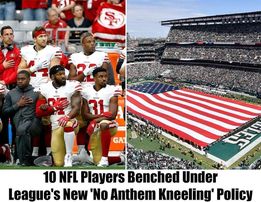In the bustling stadiums where cheers reverberate and the spirit of competition thrives, the recent implementation of the National Football League’s (NFL) “No Anthem Kneeling” rule has injected a new dimension into the dynamics of the game – one that extends beyond the football field and into the realms of social and political discourse.
As ten players find themselves removed from their respective games, the contours of the conversations around freedom of expression, patriotism, and the role of sporting entities in political and social issues are redefined and brought back into the collective consciousness of society.
The unveiling of the NFL’s “No Anthem Kneeling” rule seems to stand contrary to the previous leniencies and understandings of athletes utilizing their platforms for social commentary. This stark change in policy has prompted a flurry of reactions, both in support and opposition, from fans, players, and pundits alike.
The act of kneeling during the National Anthem, initially popularized by Colin Kaepernick in 2016, has grown to become a symbolic gesture in the fight against racial injustice and police brutality in the United States. Players choosing to kneel seek to utilize their visibility to shine a light on systemic issues, sparking national and international discourse around these themes.
In response to the rule, ten players, undeterred by the potential consequences, knelt during the National Anthem in recent games and were subsequently removed, per the new guidelines. These athletes, heralded by some as champions of free speech and criticized by others as disrespecting national symbols, found themselves at the intersection of the sport and social justice movements.
The impact of the rule and subsequent removals of players has sent ripples across the diverse NFL fan base. Social media platforms have become arenas for dialogue and debate, with hashtags trending in support of and against the rule and removed players.
Inside the locker rooms, players, coaches, and staff grapple with the new policy. While some may view the rule as a necessary step to keep sports and political commentary separate, others perceive it as a limitation on the players’ rights to freely express their beliefs and support social justice movements.
The rule’s legal and ethical standing is scrutinized by experts, pointing to potential conflicts with freedom of speech and expression principles. Players’ unions and legal representatives are likely to explore the implications of the rule and its enforcement, navigating the complexities of employment law, contractual obligations, and individual rights.
The impact of the NFL’s policy extends into broader societal and political contexts. Politicians, activists, and public figures weigh in, framing the rule and players’ removals within larger narratives pertaining to patriotism, respect, and the role of entities in social justice issues.
The unfolding situation sets a precedent, shaping the future interactions between sports, politics, and societal issues. The NFL, its players, and other sporting leagues will continue to navigate the balance between maintaining the essence of the game and providing a platform for athletes to express their views.
Media outlets, sports journalists, and commentators find themselves dissecting and discussing the myriad perspectives and facets of the rule and its implications, shaping public perception and debate.
As stadiums fill and games proceed, the dialogue surrounding kneeling during the anthem, the players’ removals, and the NFL’s rule is unlikely to subside. The discussions will persist, perhaps evolving to navigate the interplay between sports, societal issues, and individual expression in new ways.
The removal of the ten NFL players under the new “No Anthem Kneeling” rule propels the continued discourse on the intersections of sports, societal issues, and freedom of expression. It is a reminder that the realm of sports, while often a means of unity and entertainment, is not isolated from the broader societal and political landscapes in which it exists.
The discussions, debates, and dialogues that have emerged in the wake of the rule’s enforcement are emblematic of the continuous interplay between the game on the field and the broader societal game in which we all participate.

Leave a Reply